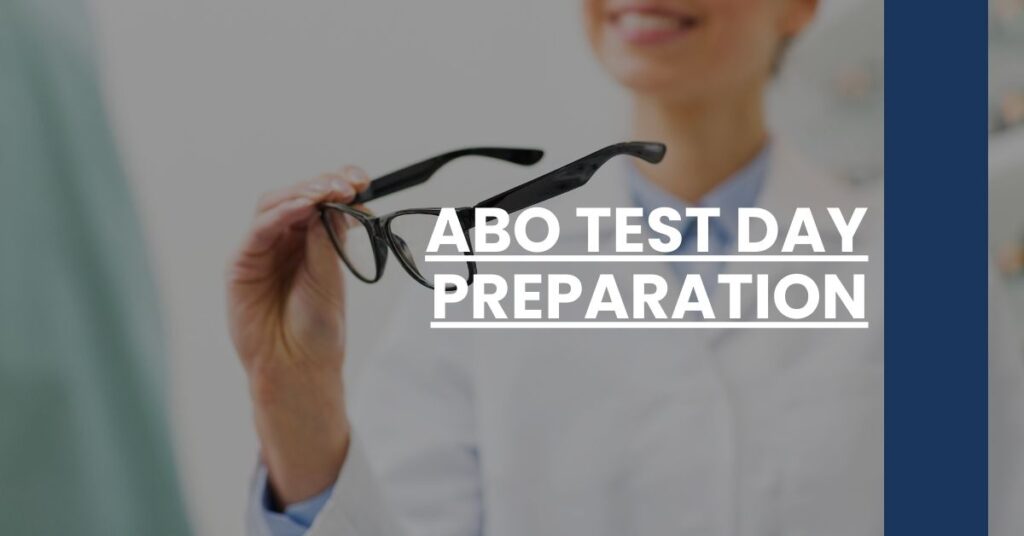ABOutest day preparation sets the stage for success. Ensure you’re equipped to tackle the exam with confidence.
- Strategize Your Study: Tailor a study plan that fits your learning style for effective ABO test day preparation.
- Practice Makes Perfect: Utilize practice tests to enhance familiarity and reduce test-day anxiety.
- Rest and Nutrition: Understand the critical role of rest and the right nutrition in your ABO test day preparation.
Embrace ABO test day preparation to navigate the challenge ahead with poise.
- Understanding the ABO Test
- Getting Familiar with the Format
- Months Before the Test: Long-Term Preparation
- Weeks Before the Test: Intensive Study Phase
- Days Before the Test: Review and Rest
- The Night Before: Ensuring a Restful Sleep
- Test Day Nutrition and Hydration
- What to Bring and What to Leave
- Mental and Emotional Preparation
- Time Management During the Test
- Post-Test Procedures and Considerations
- Conclusion: Reflecting on the Experience
Understanding the ABO Test
Embarking on the path to certification or medical licensing often involves a critical milestone: the ABO test. This test isn’t merely a formality; it’s a gateway ensuring that healthcare professionals understand the critical intricacies of blood group antigens and antibodies vital for safe blood transfusions and organ transplants.
ABO Blood Test History: Tracing back to Karl Landsteiner’s discovery in the early 1900s, the understanding of the ABO blood group system has revolutionized medicine. Grasping this system’s complexities not only safeguards patient care but is also a cornerstone in prenatal care, forensic science, and even anthropology.
Why ABO Testing Matters
Whether you’re a seasoned professional brushing up on your skills or a bright-eyed newcomer, the ABO test certifies that your knowledge aligns with the precision required for optimal patient outcomes. So, as daunting as preparation may feel, remember that it represents a significant stride in your commitment to medical excellence.
Getting Familiar with the Format
Understanding the test format is just as crucial as mastering the content. The ABO test’s structured yet diversified approach assesses your theoretical grasp through practical scenarios.
- Multiple-Choice Questions: The exam consists of single-response, multiple-choice questions designed to challenge your critical thinking and application of knowledge.
- Sectional Segregation: Questions are presented in sections that evaluate specific domains within your field, ensuring comprehensive coverage of the curriculum.
- Scored vs. Unscored Items: While the majority of the questions will determine your fate, some are pilot items aimed to test potential future material.
Tackling Question Types
Delving into past papers and familiarizing yourself with the nature of questions can significantly boost your confidence. Practice discerning the crux of clinical scenarios and theoretical questions to elevate your ABO test day preparation.
Months Before the Test: Long-Term Preparation
Long-term preparation for the ABO test is an exercise in discipline and foresight. Proper planning can alleviate the stress that naturally accumulates as test day approaches.
- Develop a Study Plan: Outline your ABO test day preparation with topics to cover every week. A clear-cut schedule keeps you on track and prevents last-minute cramming.
- Reference Authoritative Sources: Whether it’s textbooks or peer-reviewed journals, ensure your study materials are credible and up-to-date.
- Leverage Study Groups: Collaboration with peers can expose you to different angles of understanding and solidify your grasp of complex concepts.
Starting Early
The early bird doesn’t just catch the worm; it also maximizes the potential for retention. Start studying several months in advance to pace your learning and embed the information deep in your memory banks.
Weeks Before the Test: Intensive Study Phase
With the ABO test on the horizon, what was once a gentle jog in preparation should shift to a steady sprint.
Focus on Weaknesses: Everyone has their Achilles’ heel. Use practice tests to identify yours and allocate extra time to these subjects. Simulated Exams: Emulate the test day experience with timed practice exams. This helps build stamina and teaches you how to manage test anxiety. Seek Feedback: Engaging with mentors or study partners to review your answers can offer new perspectives and refine your understanding.
Practice Makes Perfect
Consistent practice translates to prowess on test day. Hammer out any creases in your technique and ensure that you are as dexterous mentally as you are knowledgeable.
Days Before the Test: Review and Rest
The final stretch before the ABO test is a balancing act between review and rest. Your brain requires time to process and consolidate information, so avoid introducing new topics at this stage.
- Summarize Your Notes: Review summaries and diagrams that encapsulate the breadth of content without delving into the nitty-gritty.
- Relaxation Techniques: Incorporating periods of relaxation through meditation or light exercise can help reset your cognitive abilities.
Trust Your Preparation
Believe in your ability and trust the months of preparation that led you here. Overconfidence can lead to careless mistakes, but a healthy assurance in your knowledge base is your greatest asset.
The Night Before: Ensuring a Restful Sleep
Securing a peaceful slumber the night before the test is not just about comfort, it’s about setting the stage for peak performance.
Establish a Sleep Routine: If you haven’t already, start going to bed and waking up at the same time each day. Avoid Stimulants: Keep caffeine and sugar at bay to prevent restlessness when you need tranquility. Mindfulness and Meditation: Engaging in mindfulness or listening to soothing music can guide you to a state of calm.
Preparing Your Mind
Sleep is the ultimate cognitive palate cleanser. Prepare not just your materials and knowledge, but also your mental clarity, for the important day that awaits. The dedication you have invested in your ABO test day preparation is about to manifest in one of the most tangible ways possible: a good night’s rest.
Test Day Nutrition and Hydration
Proper nutrition and hydration are crucial components of your ABO test day preparation. What you consume can affect your cognitive performance, energy levels, and overall comfort during the exam.
Best Foods for Focus and Energy
- Complex Carbohydrates: Foods like whole-grain bread, oatmeal, and sweet potatoes release energy gradually, which can help maintain focus throughout the examination period.
- Protein: Snacks such as yogurt, nuts, and lean meats can sustain your energy and prevent hunger pangs, helping you concentrate on the task at hand.
- Fruits and Vegetables: These natural goodies are filled with vitamins, minerals, and fibers. A piece of fruit or a small salad can offer the quick glucose your brain craves without a heavy feeling in your stomach.
Hydration Hacks
- Water Is King: Aim to stay hydrated with water, rather than beverages high in caffeine or sugar. Dehydration can lead to headaches and fatigue, thus reducing your ability to perform optimally.
- Timing Is Everything: Hydrate steadily leading up to the test, but be mindful not to drink too much right before starting to avoid unnecessary bathroom breaks that could disrupt your concentration.
Foods and Drinks to Avoid
Certain foods and beverages can sabotage your test performance. You’re better off steering clear of heavy, greasy meals and excessive caffeine, which might cause discomfort or jitteriness.
What to Bring and What to Leave
Come prepared with the essentials, but also be aware of what’s not allowed in the testing center. Having the right items can smooth the way for a stress-free exam, without the panic of forgetting something important or the disruption of having a banned item confiscated.
Essential Items for Your Test Day Kit
- Identification: A government-issued ID is typically required to verify your identity.
- Admission Ticket: If applicable, ensure to carry your test confirmation or entry document.
- Water: A small water bottle could be instrumental in keeping you hydrated.
- Snacks: Choose snacks wisely, considering both your energy needs and the testing center’s policies.
What You Cannot Bring
Familiarize yourself with the test center’s rules in advance. Electronic devices, large bags, and sometimes even watches may not be permitted. When in doubt, leave it out.
Mental and Emotional Preparation
Stress management and a positive outlook are as valuable as any study material in your ABO test day preparation toolkit. Cultivate techniques that bolster your mental resilience and maintain calm.
Techniques to Reduce Test Anxiety
- Deep Breathing: In times of stress, deep, diaphragmatic breathing can induce calmness and reduce anxiety.
- Visualization: Imagining a successful test experience can heighten your confidence and reduce nervousness.
- Affirmations: Positive self-talk can reframe your mindset from one of anxiety to one of capability and preparedness.
Establishing a Positive Mindset
Remember, your attitude can influence your performance. Approach the test with the assurance that you have prepared thoroughly and that you are capable of tackling the challenges ahead.
Time Management During the Test
The efficient allocation of time during the exam can make a significant difference in your performance. Here’s how to ensure each section gets the attention it deserves without losing track of the clock.
Time Management Strategies
- Allocate Wisely: Prior knowledge of the test’s structure can assist you in dividing your time suitably between sections.
- Stay Aware: Wearing a simple watch may help you keep track of time if clocks aren’t visible or electronic devices aren’t allowed.
- Pace Yourself: Keep a steady pace to address all questions. If you find yourself stuck, move on and return later if time allows.
Remember, it’s not just about fast responses, but also about thoughtful consideration of each question.
Post-Test Procedures and Considerations
After you lay your pencil down or click the final submit button, there are still steps to follow. Most importantly, it’s understanding how to decompress and handle the waiting period for results.
Immediate Aftermath
It’s normal to experience a mix of emotions once the test is over. Take a moment to breathe and acknowledge the effort you have put in. This is an important aspect of self-care post-exam.
Waiting for Results
Waiting for results can be a period of uncertainty. Engage in activities you enjoy and that can help redirect your focus. Regardless of the outcome, there is value in the learning process and growth experienced through intense preparation.
Conclusion: Reflecting on the Experience
As you look back on your journey of ABO test day preparation, regardless of the result, take a moment to acknowledge your hard work, determination, and the knowledge you’ve gained. This process wasn’t just about the test—it was a significant step in your professional development.
The Journey Matters
The journey of ABO test day preparation is lined with self-discovery, learning, and growth. You’ve expanded your expertise, sharpened your test-taking skills, and pushed your limits. This experience builds not only your resume but also your character.
Every challenge faced, whether it involves mastering new material or practicing self-discipline, is progress. As you march forward in your career, the foundation you’ve laid through comprehensive ABO test day preparation will support your continued success.

